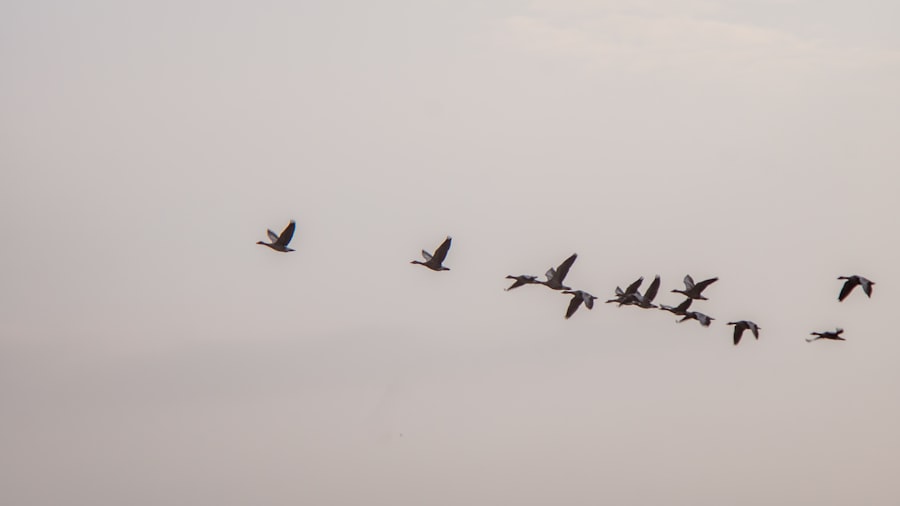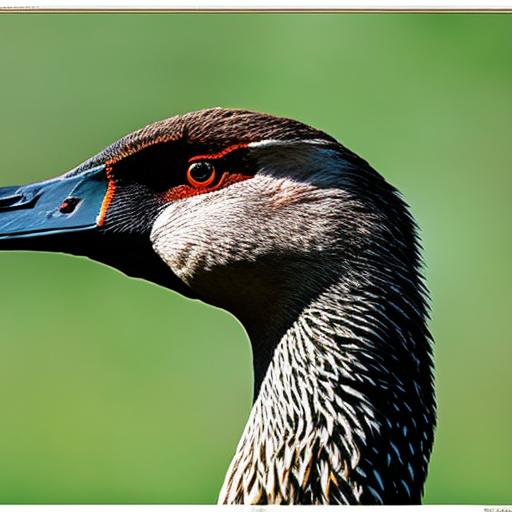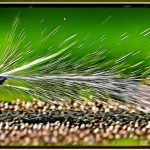Geese are large waterfowl that are commonly found in many parts of the world. They are known for their distinctive honking sound and their V-shaped flying formation. Geese are highly adaptable and can be found in a variety of habitats, including parks, golf courses, and residential areas. They are social animals that live in flocks and are known for their aggressive behavior when they feel threatened.
Understanding geese behavior is crucial for effective control and prevention. Geese can cause a range of problems when they infest an area, including property damage, environmental damage, and health risks. By understanding their habits and behaviors, property owners can implement strategies to deter geese and minimize the negative impact they have on their surroundings.
Key Takeaways
- Geese can be a nuisance due to their droppings, aggressive behavior, and noise.
- Natural ways to keep geese away include planting certain types of vegetation and using dogs or other animals to scare them off.
- Landscaping can play a role in geese control by creating barriers and reducing the attractiveness of an area to geese.
- Scare tactics, such as decoys and lasers, can be effective in deterring geese.
- Visual deterrents, such as reflective tape and balloons, can also be effective in geese control.
The Problems Associated with Geese Infestations
Geese infestations can have a significant negative impact on both property and the environment. One of the main problems associated with geese is the damage they can cause to lawns, gardens, and other vegetation. Geese feed on grass and other plants, often leaving behind bare patches of ground and uprooted vegetation. This can be particularly problematic for golf courses and parks, where maintaining a pristine appearance is important.
Another issue with geese infestations is the health risks associated with their droppings. Geese droppings contain high levels of bacteria, including E. coli and Salmonella, which can contaminate water sources and pose a risk to human health. In addition, the accumulation of droppings can create an unsightly mess and an unpleasant odor.
Natural Ways to Keep Geese Away
There are several natural ways to keep geese away from an area without causing harm to the birds or the environment. One method is to plant certain types of vegetation that geese find unappealing. For example, geese tend to avoid plants with strong odors, such as lavender or rosemary. Planting these types of vegetation around the perimeter of a property can help deter geese from entering.
Another natural method is to use natural predators to scare away geese. Dogs are particularly effective at keeping geese away, as their presence can be intimidating to the birds. Similarly, using trained hawks or falcons can also be an effective deterrent, as geese are naturally wary of birds of prey.
The Role of Landscaping in Geese Control
Proper landscaping techniques can play a significant role in deterring geese from nesting and feeding on a property. One important aspect of landscaping for geese control is to create an environment that is not conducive to nesting. This can be achieved by removing tall grasses and shrubs near bodies of water, as these provide ideal nesting sites for geese.
In addition, maintaining a clean and tidy property can help deter geese from feeding on vegetation. Regularly removing fallen leaves, grass clippings, and other debris can make an area less attractive to geese. It is also important to keep lawns well-maintained and properly irrigated, as healthy grass is less appealing to geese.
The Use of Scare Tactics to Deter Geese
Scare tactics can be an effective way to deter geese from an area. One common scare tactic is the use of decoys, such as plastic owls or coyotes. These decoys mimic natural predators and can help create the illusion that an area is unsafe for geese. Another scare tactic is the use of balloons or flags that move in the wind. The movement and noise created by these objects can startle geese and discourage them from staying in an area.
The effectiveness of scare tactics in geese control can vary depending on the specific situation. Some geese may become habituated to certain scare tactics over time, so it is important to regularly change the location and appearance of decoys or other scare devices to maintain their effectiveness.
The Effectiveness of Visual Deterrents in Geese Control

Visual deterrents can be an effective way to keep geese away from an area. One common visual deterrent is the use of reflective surfaces, such as mirrors or shiny tape. These surfaces create a glare that can startle geese and make them feel uncomfortable. Similarly, using lights that flash or move can also be effective in deterring geese, as they are naturally wary of sudden movements and bright lights.
Visual deterrents work by creating a sense of unease and discomfort for geese. By making an area appear unpredictable and unsafe, geese are less likely to stay in the area and will seek out a more secure location.
The Use of Sound Deterrents in Geese Control
Sound deterrents can be an effective way to deter geese from an area. One common sound deterrent is the use of sirens or loud noises. These sudden and loud sounds can startle geese and make them feel threatened. Another sound deterrent is the use of bird distress calls, which mimic the sounds made by injured or distressed birds. Geese are naturally wary of these sounds and will often avoid areas where they are present.
Sound deterrents work by creating a sense of danger and alerting geese to potential threats. By associating certain sounds with danger, geese are less likely to stay in an area and will seek out a safer location.
The Role of Physical Barriers in Geese Control
Physical barriers can be an effective way to keep geese away from an area. Fences or netting can be used to create a physical barrier that prevents geese from accessing certain areas. For example, installing a fence around a pond or garden can help keep geese out and protect the area from damage.
Physical barriers work by creating a physical obstacle that geese cannot easily overcome. By preventing geese from accessing an area, property owners can effectively control and prevent geese infestations.
The Use of Repellents in Geese Control
Repellents can be an effective way to deter geese from an area. Taste deterrents, such as bitter sprays or gels, can be applied to vegetation to make it unappealing to geese. Similarly, scent deterrents, such as predator urine or citrus oils, can be used to create an unpleasant odor that geese find repulsive.
Repellents work by creating a negative association with an area or object. By making an area or object unappealing or unpleasant, geese are less likely to stay in the area or interact with the object.
Long-Term Strategies for Geese Control and Prevention
While implementing short-term deterrents can be effective in controlling geese infestations, long-term strategies are necessary for sustainable geese control and prevention. Consistent maintenance and monitoring are key to ensuring that geese do not return to an area. Regularly inspecting the property for signs of geese activity, such as droppings or feathers, can help identify potential problem areas and allow for prompt action.
In addition, property owners should be proactive in implementing a combination of deterrents and strategies. By using a variety of methods, such as landscaping techniques, scare tactics, visual deterrents, sound deterrents, physical barriers, and repellents, property owners can create a comprehensive approach to geese control and prevention.
Overall, geese control and prevention requires a combination of tactics and strategies. By understanding geese behavior and implementing a variety of deterrents, property owners can effectively keep geese away and maintain a clean and safe environment. It is important to regularly assess the effectiveness of these strategies and make adjustments as needed to ensure long-term success in geese control and prevention.
If you’re looking for ways to keep geese away from your property, you might also be interested in learning about the importance of a well-designed floor for your chicken coop. A sturdy and properly constructed floor can help prevent predators, including geese, from gaining access to your chickens. To find out more about creating the ideal floor for your chicken coop, check out this informative article on Poultry Wizard: https://poultrywizard.com/keeping-chickens/floor-of-chicken-coop/.
FAQs
What are some natural ways to keep geese away?
Some natural ways to keep geese away include using decoys, planting certain types of vegetation, and using noise deterrents.
What are some man-made ways to keep geese away?
Man-made ways to keep geese away include using physical barriers, such as fences or netting, and using chemical repellents.
Why is it important to keep geese away?
Geese can cause damage to property, create unsanitary conditions, and pose a safety risk to humans. Keeping geese away can help prevent these issues.
What are some common areas where geese are a problem?
Geese are often a problem in parks, golf courses, and other areas with bodies of water. They may also be a problem in residential areas with large lawns or open spaces.
Are there any laws or regulations regarding geese control?
Yes, there may be local or state laws and regulations regarding geese control. It is important to check with local authorities before implementing any control measures.
Meet Walter, the feathered-friend fanatic of Florida! Nestled in the sunshine state, Walter struts through life with his feathered companions, clucking his way to happiness. With a coop that’s fancier than a five-star hotel, he’s the Don Juan of the chicken world. When he’s not teaching his hens to do the cha-cha, you’ll find him in a heated debate with his prized rooster, Sir Clucks-a-Lot. Walter’s poultry passion is no yolk; he’s the sunny-side-up guy you never knew you needed in your flock of friends!







